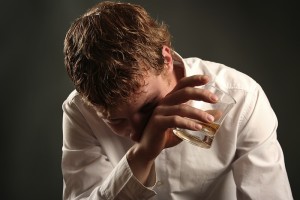Get Help With Alcohol Addiction
- Find meetings near you
- Discover online or in person meetings
- Get 24 hour information on addiction
With alcohol being a permanent fixture in modern-day society, it’s no wonder so many people start out using alcohol on a casual basis. For some, this casual indulgence can evolve into a full-blown addiction problem when left unattended.
In cases where a person struggles with bouts of depression or anxiety, the tendency to engage in alcohol abuse rises considerably. According to the Georgia Department of Human Services, an estimated 37 percent of alcoholics struggle with a co-occurring psychological disorders.
Self-medicating with alcohol not only increases the risk of alcohol addiction, but also worsens his or her psychological state. Being able to identify signs of self-medicating can help a person make the decision to get needed alcohol addiction treatment and put a stop to a habit that has the potential to destroy his or her life.
The Relationship Between Alcohol and Depression
As an occasional indulgence, alcohol offers a quick, accessible means to elevate one’s mood and loosen up. When consumed in excess amounts alcohol produces the near opposite effect, leaving a person depressed, fatigued and irritable once withdrawal takes hold. In turn, uncomfortable withdrawal effects often drive frequent drinkers to consume more alcohol in an effort to gain relief.
According to the National Institutes of Health, alcoholism and emotion- or affective-based psychological disorders tend to run in families. This pattern of co-occurrence stems from the interrelationship between alcohol and emotions in terms of how the symptoms associated with alcoholism and psychological imbalance aggravate one another.
Alcohol’s Effects in the Brain
In small amounts, alcohol produces stimulant-like effects which place a person in a happy, easy-going mood. In large amounts, alcohol acts as a depressant, slowing down chemical processes throughout the brain and body. According to the National Institute on Alcohol Abuse & Alcoholism, alcohol interacts with same brain chemical processes that contribute to the formation of mental illness. With chronic drinking, the brain’s chemical makeup starts to take on the same imbalances as those associated with psychological disorder.
Signs You’re Self-Medicating
Someone who’s using alcohol to self-medicate symptoms of psychological disorder essentially uses alcohol’s effects as a means for coping with everyday stressors and pressures. Considering how the brain develops an increasing tolerance for alcohol’s effects, addiction can easily develop in the process.
Signs of self-medication typically take the form of:
- Drinking first thing in the morning
- Drinking on the job
- Excess drinking during family functions
- Drinking when stressed
- Drinking to drown out difficult emotions
Without needed alcohol addiction treatment, a person will become even more so dependent on alcohol to cope with daily life.
When to Consider Alcohol Addiction Treatment
Alcohol addiction drives a person to keep drinking in spite of the negative consequences that result. In this respect, addiction functions as a compulsive behavior that overtakes a person’s ability to control or manage.
Signs that a person should consider alcohol addiction treatment include:
- Relationship problems
- Loss of employment or problems at work
- Problems with the law, such as DUIs or public intoxication
- Money problems
- A worsening of depression or anxiety-based symptoms
- Loss of interest in previously enjoyed activities
- Decline in health status
